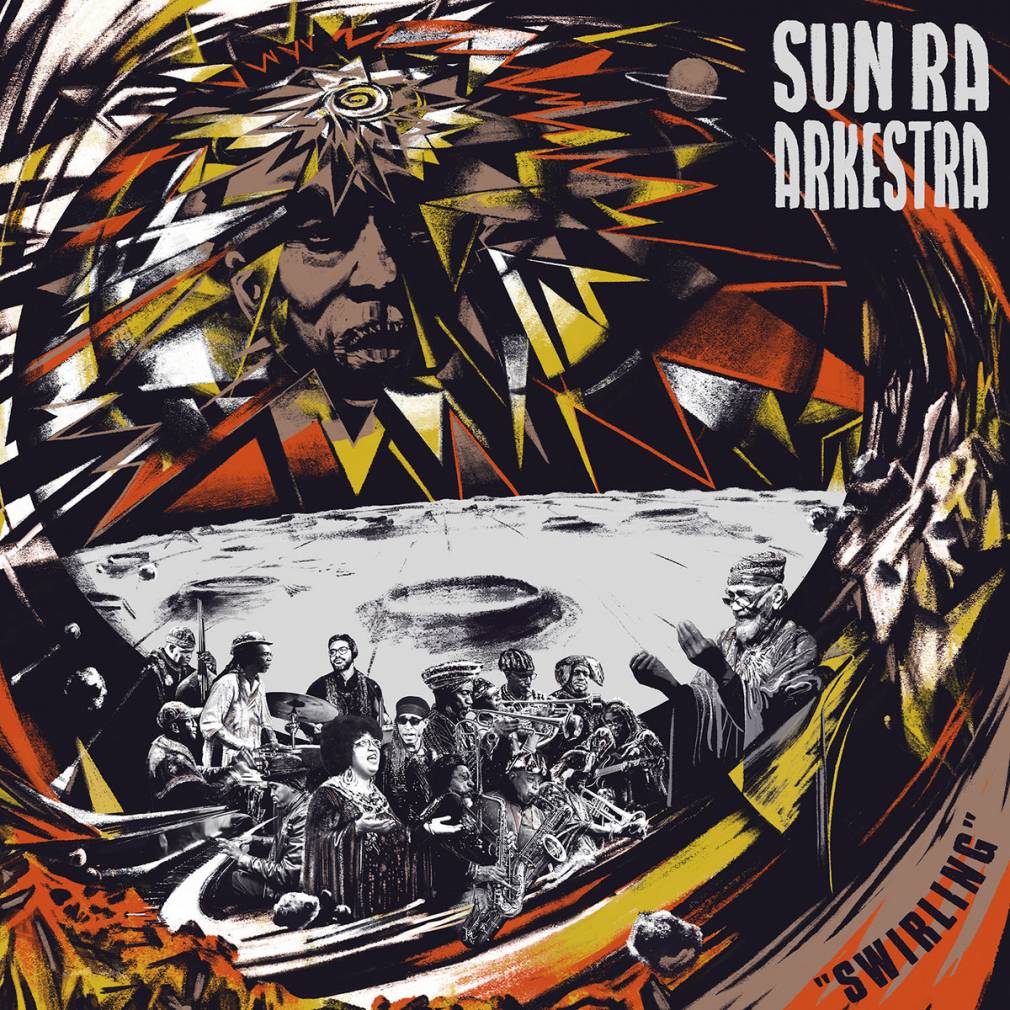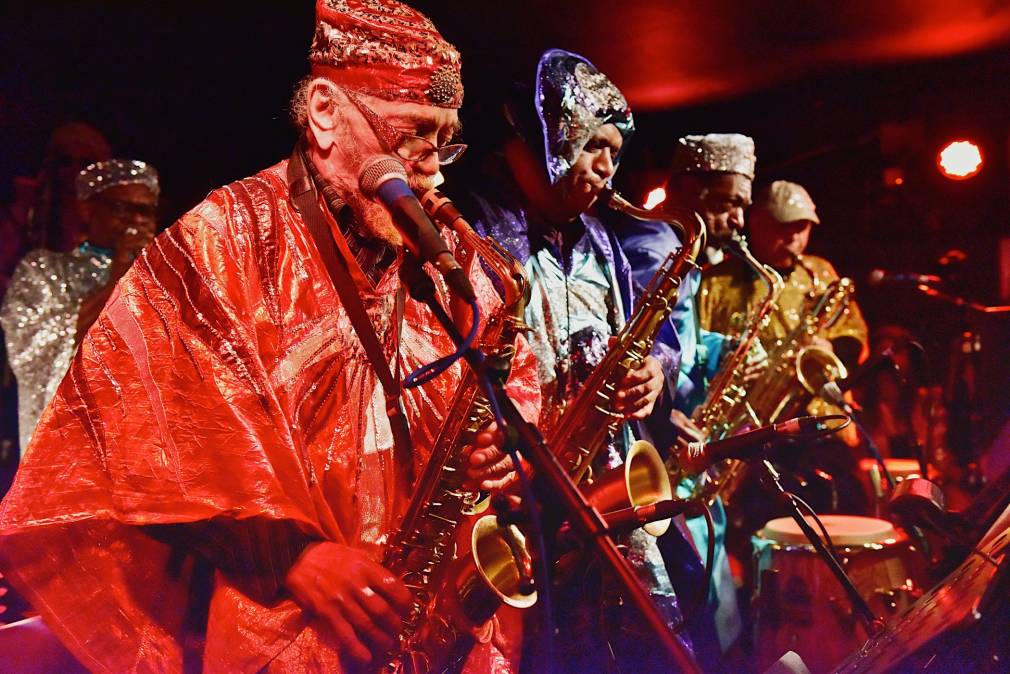It’s been over 20 years since we’ve had new music from the discography of the Arkestra, the cosmic spaceship armed with the soul of Sun Ra. There were albums, reeditions or alternate takes, jubilitory concerts, but not a new album in as appropriate form or timing. It is done with Swirling, literally by “making a stir”, a title which reveals that though dead since May 30, 1993 in Birmingham, where he was born about eighty years earlier (nothing is certain on this subject), the supreme guide is always “present” to guide this formidable jazz machine, in the fullest sense of the term. The Arkestra therefore, a big band which sailed under many names (Myth Science, Astro-Infinity, Space Arkestra to name only three) as it borrowed all the avenues of jazz (from the free jazz in which the pianist and conductor of the orchestra was considered as the Pharaoh, to the “jungle music” dear to his two peers, Ellington and Henderson). The “mythical” formation is still alive and well today, as this collection proves in more ways than one; a whirlwind of notes which inspired the name of this disc which runs through some of Sun Ra’s beautiful beaches. It’s also more rare, one must not forget the project includes an unpublished original composition by Marshall Allen. This saxophonist, a veteran of nearly a hundred years, still valiant, has been leading the maneuver of the Arkestra for almost thirty years. He was the ideal member to answer a few questions, with the youngest (64 years old anyway!) Knoel Scott at his side, venerable saxophonist who joined this flagship orchestra in 1979.
Why did you give the title of the album Swirling? Is it the feeling your music should give? How to play this music?
Knoel Scott: Swirling musically describes the link between Marshall and Sun Ra. The Arkestra would not have survived if it wasn’t for Marshall and Marshall is entirely responsible for the existence of the Arkestra after Sun Ra. “Swirling” as a composition reflects his own background as well as his excellence in terms of the Sun Ra tradition, the way he uses the voices, the use of a 6-bar phrase instead of a traditional 8-bar phrase which creates that swirling effect. As the title says, it is something that swirls and develops. This is not just a bunch of cats reminiscing on bygone days. It is a living entity that keeps growing and developing. The universe swirls, the earth swirls. When you look at pictures of the Milky Way, it’s a swirl. So, it’s the both old and the new. It’s a traditional big band composition but with a modern tinge. That all has to do with the swirling effect so we figured that the title reflects the evolution of the Arkestra.
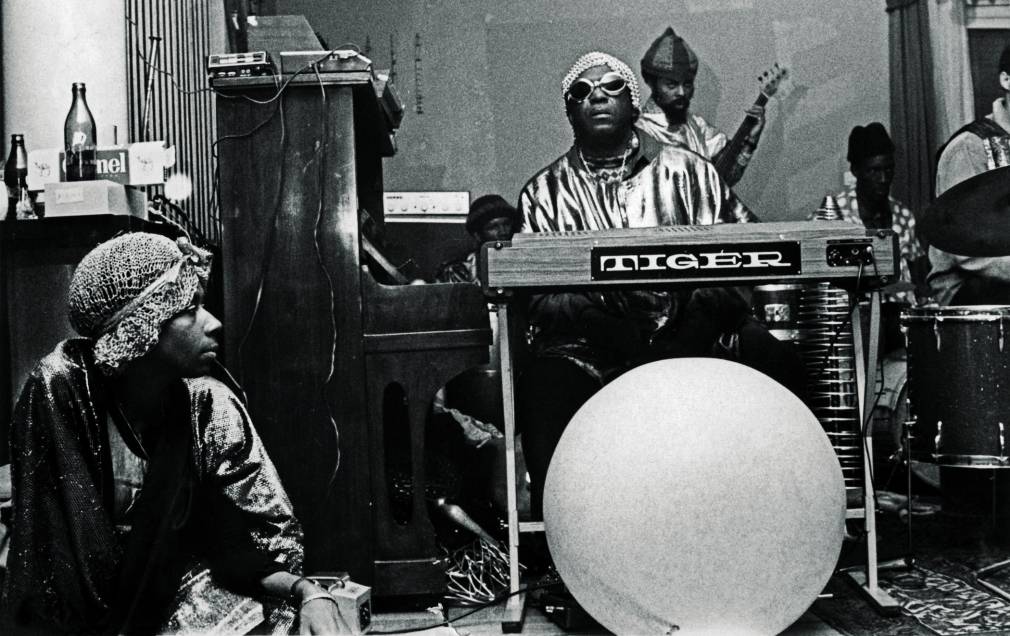
When and how did you meet Sun Ra? What attracted you to his music?
Marshall Allen: The music attracted me to Sun Ra. I heard a demo with three or four bands on it plus Sun Ra. I listened to everything on the tape but only one thing got me – when Sun Ra was playing one of his tunes. It was swinging, man. It had a beautiful thing. Joe Segal, a Chicago jazz impresario, said, “well, he’s rehearsing up there where you live. You live on the South side. Go up and see him.” Sun Ra rehearsed at this ballroom every night and was always looking for talent so I said, “Well, I’m going up there tomorrow when I get off work.” It was only six or eight blocks from my house so I went up there. He was sitting at the table writing stuff and the band was playing. So, I went up with my horn and joined in. All they did was talk about ancient Egypt and outer space. I was just sitting there listening. It was the compositions of the band that got me; it had that depth in it and different ideas. I was like, “Wow!” That’s how I first met Sun Ra.
Knoel Scott: I was introduced to Sun Ra by Makanda Ken McIntyre who was my Professor at the University of Old Westbury and he had an open door policy at his office. He convened the African-American program at the state university. During his lectures and classes, he would always bring up Sun Ra when he was describing certain jazz concepts. I had already been listening to Fletcher Henderson but I then picked up a Sun Ra album, ‘Jazz In Silhouette’. I am realising the similarities between Me and Marshall here because I listened to it and thought, “This is the best thing in the world.” I had heard Duke and Basie and they were excellent but Sun Ra was different. That band was perfect, flawless. I found out that a classmate, Craig Harris, was playing with the band so I said to him, “could you put me down with Sun Ra? Because I be down with him!” At that time, Craig wanted to get out of the band and you had to get Sun Ra’s blessing for that because he didn’t want you playing with nobody else. He wanted to leave but didn’t want Sun Ra to be mad with him because he had really strong vibrations. So, he arranged an audition with me and some other musicians in New York. It was a trade-off – we would go to Sun Ra and he would get a blessing to leave. Craig told me that 20 years later, I never knew that! So, Sun Ra auditioned me. Then, I went to see him at the Beacon. You had Danny Davis and June. They walked down the aisle and Sun Ra looked like the incarnation of Pharoah. June looked like Nefertiti and the band all followed. Not only was the music fantastic but the message and everything that I had studied about ancient blacks and Egypt, that we were the true Egyptians, was in front of my eyes. Yes, so it is so! Sun Ra was my first validation of that. Still to this day, ‘Jazz In Silhouette’ is my favourite Sun Ra album. The solos, the arrangements, the ensemble sections, the variety… Oh man.
Sun Ra was as much a spiritual guide as a conductor. Is this duality essential to be able to create innovative jazz in big bands?
Marshall Allen: Those that were creative and spiritual, those were often the musicians that wanted to do something different. The only leader in town truly doing something new, on many levels, was Sun Ra. There was something different about him. Everybody wanted to play with him and there were many good musicians around but a lot of them were doing other jazz things too; they had their own groups and were playing with different people. Sun Ra attracted those who were seeking something different, new ideas and a new use of melody. He had the best musicians in his band and the most unique ideas.
Knoel Scott: Sun Ra as a spiritual guide was, I believe, unique. If you look at Duke or Mingus or Miles, those three in particular, their music was unique but it wasn’t different like Sun Ra. They were groundbreaking but I don’t think anyone would have called them spiritual guides. While they may have occasionally touched on spirituality, it was Sun Ra who gave birth to those people who dealt with the Creator as a source of enlightenment. Everybody else came after Sun Ra: Pharoah Sanders, Art Ensemble Of Chicago, Ornette, all came later. I believe Sun Ra was the first bandleader to be a spiritual teacher. None of the others developed a system of equations or analysis or cosmology, as complex or as far reaching, as futuristic and as historically based as Sun Ra. He was a scholar. His role was unique. Is it a requirement for creativity? I guess history would say, no, it’s not a requirement but those who have stretched themselves to the outer limits of creativity seemed to have been spiritually blessed. Sun Ra stands alone in that respect, at the pinnacle.
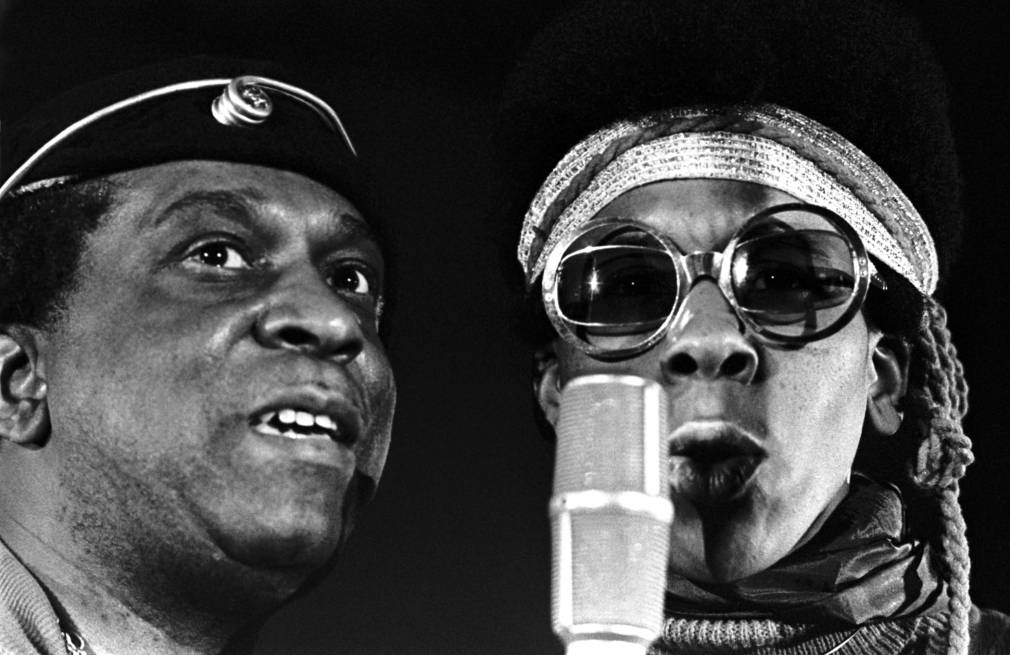
The notion of discipline was fundamental with Sun Ra, a bit like with James Brown or Frank Zappa. How was this discipline exercised in everyday life and on tour? How can discipline be a source of joy and creativity?
Marshall Allen: It takes discipline for man to learn anything! How can you learn anything without discipline? Simple as that. So, it’s not that I can’t learn. I got to have some discipline. I got discipline to sit here, sit here, sit here and run my mouth. Otherwise, I’d be “wait a minute, I’ll be right back” and I would be running around. All the things you like to do and all the things you think you should do, you make them happen with discipline. It can be a source of joy and creativity. Without discipline, you ain’t gonna get it, you ain’t gonna learn anything.
Community spirit was very important to the Arkestra. what does this spirit symbolize in African-American history?
Marshall Allen: It’s like the new President now, this is what he is trying to do. (interviewer: Which President?!! ?) He is trying to bring us all back together. The likes and the dislikes, the yes’s and the no’s, to bring them all to a place for everybody. You can find your place in space. He’s saying that, even if you disagree with me, you’ll still find your place in space. He’s trying to do the same thing that Sun Ra was trying to do, in a general way. Sun Ra had the good musicians who would understand that you had to leave certain things alone and you would get to where you needed to be.
Knoel Scott: The African American community is an extension of family. Somebody else’s child is your child, somebody else’s brother is your brother. Most African-American communities are like that.
Marshall Allen: Somebody say, “I don’t always play what you want, I play what you need.” What you need is for everyone. If you’re talking what you want – I want this, he wants that, they want something else. If we get what we need, all of us can get some.
Knoel Scott: Sun Ra said, “It’s not for everybody. Many are called, few are chosen.” Like, for example, people who have the intention to make it to a Sun Ra concert and something distracts them, so they don’t get there. It’s for those who need it and hopefully they will get something from it.
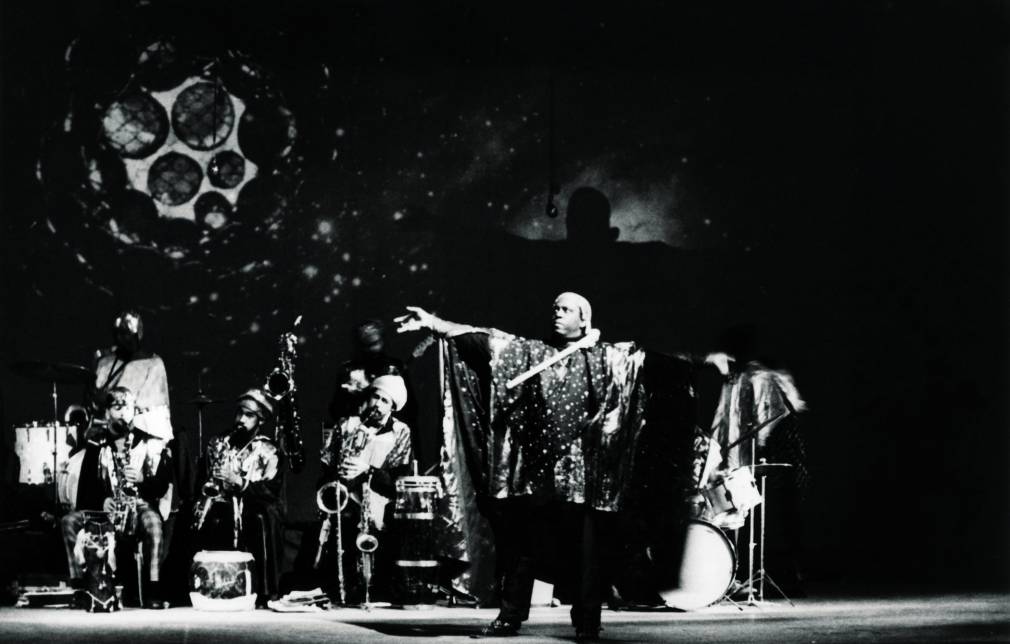
No innovation without tradition. Is this one of the important messages to hear in your music? and why ?
Marshall Allen: It’s one of them but it is one of many.
Knoel Scott: For me, it don’t mean a thing if it ain’t got that swing. When I look at how Sun Ra reached back to Fletcher Henderson and and bought Henderson back to the forefront – that was one of the most swinging bands. Sun Ra saw that, with the advent of electronics, he foresaw the age of roboticism in a digitalised world and that it would seep into the mindset and the spirits of people. So many musicians now are roboticised. There’s a robot on youtube that plays ‘Giant Steps’. Sounds like the way most people play it! So, that swing tradition is the fundamental characteristic of African-American music. It don’t mean a thing if it ain’t got that swing.
Marshall Allen: Music is a language. I can say whatever I want through my music. I can tell you what the true ‘me’ is. Music can heal, music can kill, music can make you laugh or cry, it can do so many emotional things.
Knoel Scott: Today’s music has been weaponised.
Marshall Allen: So, you have to be sincere and it has to come from the spirit and from the heart. You have to give somebody something. If you give somebody something that’s no good, then it achieves nothing. Then your eggs are rotten. If your eggs are rotten, you can’t eat ‘em! So now we have to change the destiny.
Knoel Scott: We have to let people hear music that has spirit.
Marshall Allen: Music does a lot of things for you. It can calm your nerves, make you happy sometimes. So, you have to be sincere in giving what you are going to give people. So, I give people what they need. I’ve lived long enough!
Finally, how is the music of the Arkestra, until today, part of the legacy of Duke Ellington and the big band era?
Marshall Allen: The foundations of things never change. With a good foundation, you can build a skyscraper.
Knoel Scott: More accurately, the key legacy would be that of Fletcher Henderson. Duke Ellington himself said that his goal was always to get his band to sound like Fletcher Henderson. Sun Ra was an extension of Henderson. And it goes on and on and on. It continues and spreads out like the branch of a tree.
Swirling is available on Strut Records.
